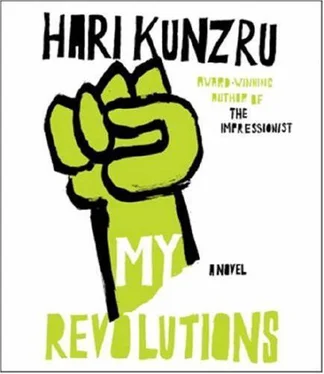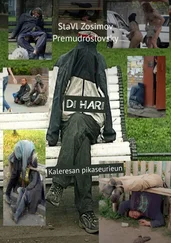The waiter hands me the wine list and does fussy things with the napkins. Anna looks out of the window. She’s wearing heavy makeup. Lots of blue eye shadow and burgundy lips, a face to match the décor.
We sit in silence, revolving slowly over Fitzrovia. The sun has gone down and the buildings are constellations of lighted windows, a vertical column of lights marking Centre Point, a black void the open space of Regent’s Park. Remembering how we’re supposed to be behaving, I take out my camera and click the shutter pointlessly into the darkness outside. Then, impulsively, I take a picture of Anna.
“Don’t do that,” she snaps. The waiter comes back, pours the wine for me to taste, takes our order. We do our best to appear animated, the young married couple from the suburbs, up in London for a special night out. We’re good at it. I almost believe in us. What, I wonder, if we were what we appear to be? What if we could just sit here and hold hands, toasting each other and looking out over London?
“I’m going to do it now,” she says. Without waiting for me to reply, she slides her bag from its position under the table, picks it up and heads in the direction of the toilet. I try not to stare. I don’t want anyone to follow my eyeline. I sit, looking fixedly out of the window. One full revolution takes twenty-two minutes. I have completed an arc of perhaps a hundred and twenty degrees when Anna returns, still carrying the bag.
“It’s locked,” she says. At that moment the waiter returns,
carrying two bowls of clear soup. We fall silent as he pours more wine into our glasses.
I wait until he’s out of earshot again. “It shouldn’t be.”
“Well, it is.”
“Did you try the observation deck?”
“We don’t know anything about who’s down there.”
“It’ll be empty.”
“We don’t know that for certain.”
“I tell you, there’s no one there, not at this time. I’ll go, if you won’t.”
This is bad. We’re not doing it properly. The Beresfords shouldn’t be arguing with each other over their romantic dinner. Near the toilets, behind a thick blue curtain, there’s a fire door opening onto a narrow set of concrete stairs that leads to the observation deck and from there to floor thirty-two, where there’s a storeroom right beside the emergency exit. On thirty-two there’s also a lot of switching equipment: a bomb placed there could shut down phone service for the whole of London. But they’ve locked the door. They’ve locked the door, which was supposed to be open.
Our information came from a friend of a friend, a girl who used to have a secretarial job at the GPO. At night, she said, the only person on the upper floors was a watchman. Jay and Leo checked it out. One evening Jay wandered around the building for almost half an hour without being challenged. He was the one who found the storeroom.
But the door’s locked.
What a farce. The door’s locked and there are gun battles on the streets of Belfast and children are dying in Biafra and in their infinite wisdom the British people have elected themselves a Conservative government. The right wing press is whispering to its readers about the enemy within, but despite our best efforts we’re still just a rumor, part of the toxic atmosphere of this old, cold, gray little country. Not for long. This action will make us real. Undeniable and real. But the door’s locked.
Here I am, surrounded by bovine executives and their
frozen-haired mistresses, proud members of the ruling class squatting in a hermetically sealed revolving bubble, chowing down on duck à l’orange: bland and selfish, totally unconcerned with all the horror inflicted in their name. I’ve made hating them into such a habit that I don’t really see them anymore, don’t regard any one of these rich white people as more or less attractive or clever or cultured or better-dressed than the others. They’re an abstraction, a quantity of power that has to be moved from one side of the balance sheet to the other. As individuals, they have no substance for me at all.
But we are agreed. We respect human life. That’s the difference between us and them. We’ve taken care not to hurt anyone with our bombs. But we need to make a point. It’s time to put an end to the silence. In Britain, established power likes things discreet. Confrontation is always a sign of failure. When the system’s working, the energies of those who resist it are always diffused, our anger spiraling down into some soft and foggy place where there’s no obvious enemy, just a row of civil service desks and a faint, receding peal of trumpets.
I can’t taste my soup. Mechanically I spoon it into my mouth. The door. The fucking door.
“Give me the bag,” I say to Anna.
“You can’t carry a woman’s bag through the restaurant. People will notice. It’ll be too obvious.”
“Just give me the fucking bag.”
I have to do something. I can’t sit and eat. My stomach has cramped up.
“I’ll do it,” she says, and gets up again, toting the heavy bag over her shoulder. I’m left in my seat, slowly revolving. I try to control my breathing. In through the nose, out through the mouth.
“Is everything all right, sir?” asks the waiter, and I stare at him as if he’s speaking a foreign language.
I don’t want death. I try to remember that. I’m twenty-two and I want life. Life for myself, life for the world, all the people of this fragile blue and green disc. This is my hope, as I sit at the table,
scraping breadcrumbs into patterns with the side of my knife: that the revolution can happen through an accretion of small actions, like moth holes on a suit left too long in a closet. Because what’s the alternative? 1917. Executions and prison camps and civil war and tens of thousands dead.
Cleansing, Anna calls it. I hate that word.
I wish she’d come back. Panic is bubbling up inside me, a primal scream, all the psychic pain knotted into my muscles. Just as sitting still is about to become intolerable, she slides back into her seat. She hasn’t got the bag with her. At the same time the waiter arrives with our main course. In answer to my unspoken question she just nods.
I stare down at my plate. A fussy little pile of mashed potato. Green beans. A pork chop.
At three A.M we phoned in a warning. At four-thirty our bomb blew up part of the thirty-first floor of the Post Office Tower, sending chunks of concrete and shards of glass showering over the roofs of Cleveland Street. By morning we were the lead item on BBC News. London landmark a target. No one was hurt, though the night watchman phlegmatically reported being “lifted two or three inches” out of his armchair. A government minister gave a statement calling it an act of insanity.
SHUT DOWN THE SPECTACLE!
Last night Post Office Tower bombed.
Because it is the lobotomy machine
the pacifier
Microwaves sent out across Britain
Television transmission
the dead hand of technology
their means of control
their communications
their message
* * *
fairy stories to distract you
REALITY: Imperialism, Colonialism, Dictatorship
REALITY: troops on British streets
REALITY: an international state of war
REALITY: the mental patient spasms with
electricity
REALITY: dead-eyed mothers on Merseyside streets
REALITY: not a GAME SHOW
We demand complete withdrawal of American troops from Indochina, British troops off British streets.
WE ARE EVERYWHERE
SHUT DOWN THE SPECTACLE
DESTROY THE RULE OF CAPITAL ARMED RESISTANCE NOW!
Even though the news report didn’t quote our communiqué I was still ecstatic, hugging the others, even punching the air, the idiotic gesture of a football player celebrating a goal. For a day or two I felt slightly manic and walked the streets in an attempt to calm myself. I covered miles of pavement, feeling the world had subtly changed. Faintly but unmistakably our idea had been absorbed into the air. Every passerby had been touched by it. There we were, a headline behind the grille of the newsstand outside the tube. There we were, propagating through the radio spectrum. Eventually my euphoria dissipated and I found myself on London Bridge, pushing feebly against a pinstriped tide of evening commuters, feeling naked, surveilled. I went home and slept, the covers pulled over my head.
Читать дальше












